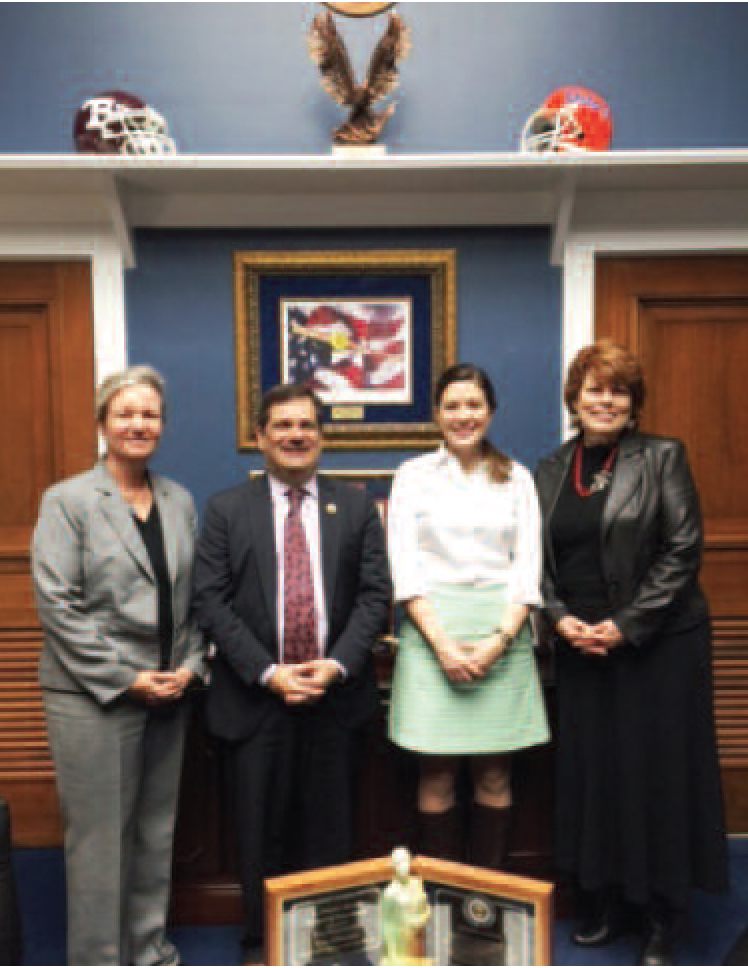Combining advocacy, education and community for commercial real estate owners, property managers and allied businesses
BOMA (Building Owners and Managers Association) Greater Tampa Bay was formed more than 30 years ago to promote the unique interests of local commercial real estate building owners and property managers, and to add value through advocacy and education.
Through its participation in BOMA Florida and its ties to BOMA International (BOMI), Greater Tampa Bay is part of an international network that includes 91 BOMA U.S. associations and 18 international affiliates whose mission is to “advance a vibrant commercial real estate industry through advocacy, influence and knowledge.”
President Sandy Ballestra says BOMA Greater Tampa Bay has three key roles: advocacy, education and to operate as a trade association for the benefit of members. In its advocacy role, the association works in concert with other local CRE (commercial real estate) and all Florida BOMA Associations to advocate for the industry locally, at the state level and nationally. “Our members assisted with successfully moving the local TBX (Tampa Bay Express) transportation initiative to the next stage earlier this year,” she said.
Members travelled to Tallahassee to lobby legislators in February, along with all other BOMA associations in the state, in an effort to repeal the sales tax on commercial leases. Currently, Florida adds a state tax of six percent and municipalities may add their own tax, as high as 1.5 percent in some areas.
“We are the only state in the union to carry this state tax and it puts us at a disadvantage with other states when it comes to attracting business,” Ballestra said. She says since Florida does not have individual income tax, this is one of the ways it has been creative with other taxes.
BOMA Greater Tampa Bay also sent members to Washington, DC to lobby congressional leaders last year for what she calls three main issues: To prevent drive-by ADA (Americans with Disabilities Act) lawsuits prevalent in the state by adding a notice period to implement changes; to reduce the depreciation period for mandatory fire sprinkler upgrades from 39 years to 15 years, and to extend the energy efficiency investment tax incentives.”
Education is the second of the association’s critical missions. Through various educational series, and networking and learning opportunities, Greater Tampa Bay vice-president Sara Wayson says members have access to a wide range of BOMI courses including Design, Operations and Maintenance of Building Systems, Environmental Health & Safety, Ethics is Good Business, Managing the Organization and Real Estate Investment & Finance, all scheduled for 2017.

Other educational opportunities include the Winter Business Meeting and National Issues Conference (January 28) and the BOMA International Conference & Expo set to take place in June. Last year Trade Show Executive “ranked the 2015 BOMA International Conference & Expo as one of the top 50 fastest-growing shows in the category of total attendance” and Wayson says it is an incredible education and networking opportunity for all members.
Connections with BOMA International also provides BOMA Greater Tampa Bay and its members with eyes on what others in the industry are doing with respect to issues including sustainability. These relationships can help drive new initiatives and opportunities locally and gives members an opportunity to be aware of future issues, she said.
“In Orlando right now for instance there is a benchmarking reporting that buildings must do. BOMA Orlando is working with the City of Orlando to ensure there are provisions for buildings who must use higher levels of energy to support specific uses so they are not discriminated against unfairly. Though this reporting does not impact us we recognize that it could in the future so will watch their progress with this.”
As a trade association, BOMA Greater Tampa Bay observes the general BOMA principle that membership should be equally divided between property owners and managers and allied members through a specifically defined 50/50 Program.
Allied members may come from a variety of interested sectors and include “firms that provide services and products to the real estate industry, including but not limited to lawyers, consultants, accountants, designers, contractors and architects.”
Allied members must, under the 50/50 Program “attend at least half of the scheduled events per year; or actively participate in a BOMA committee attending at least 75 percent of committee meetings or events; or be an annual Platinum or Gold level sponsor of the local.”
Ballestra says the association wants to ensure allied members are there for the benefit of members and the industry as a whole. Part of the 50/50 initiative, she says, is to ensure a balanced, stable membership with shared values. The aspect of shared values is supported by an Allied Member Committee who works to ensure the allied members’ participation is based on networking and expertise, rather than simply a selling opportunity for the allied member. “We look at our allied members as partners and rely on their expertise. We want them there offering advice to our members.”
In order to ensure its 50/50 balance, the association requires that interested parties apply for membership and be placed on a wait list which is maintained and monitored throughout the course of the year.
For more information, visit http://bomagtb.org.







